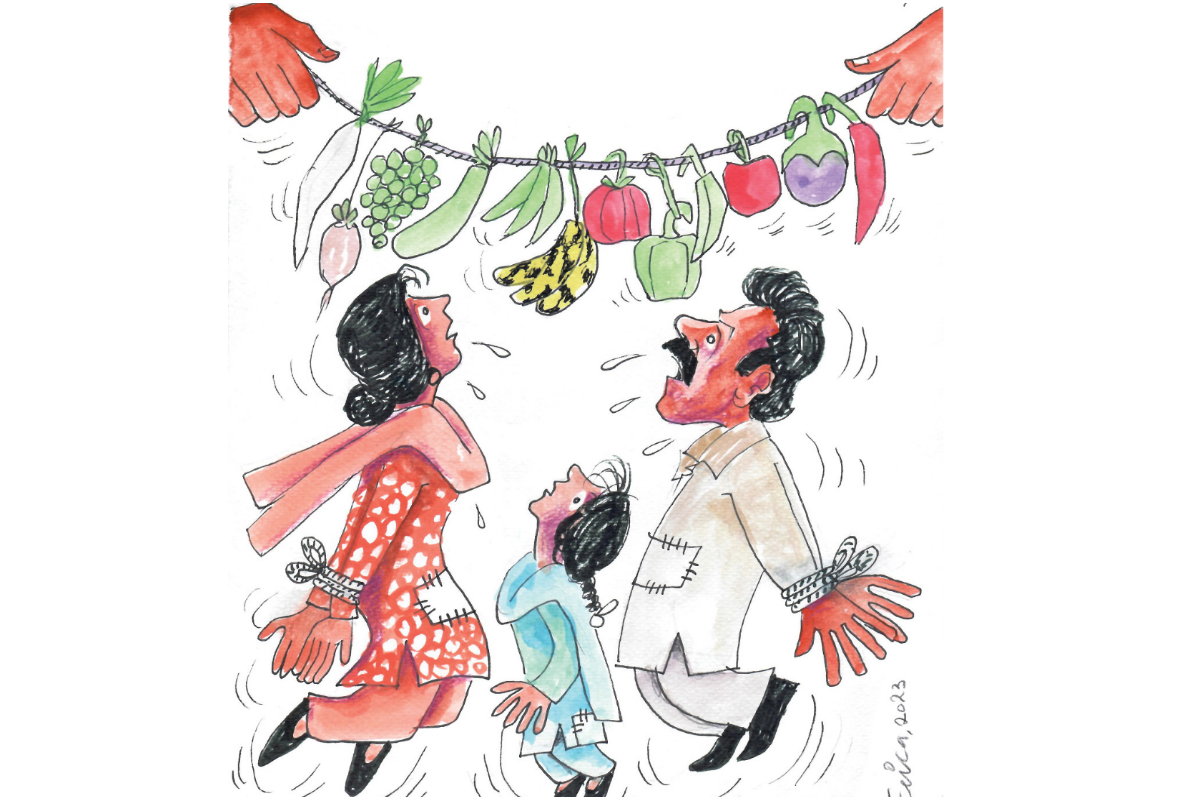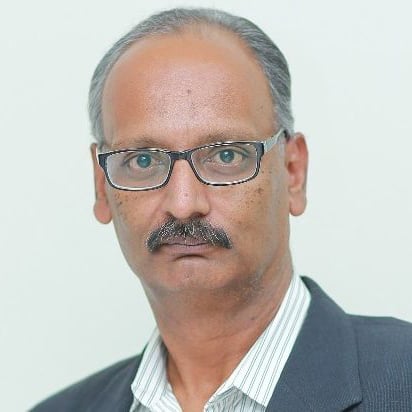
Living Beyond Means
Food inflation is making it hard for the most vulnerable segment of the society
Karachi: As inflationary pressures soar to the unprecedented levels, feeding and clothing his family has become almost impossible for Baaz Khan, a middle-aged driver working at a bungalow in Karachi’s Defence Housing Authority (DHA).
“With a monthly salary of 25,000, I can hardly pay for three meals a day for my family, much less providing for other basic necessities as prices keep rising,” he says.
A helper at another bungalow, Gulzar Ali, 22, faces a similar situation. He was to get married two years ago, but it was postponed several times due to his financial troubles. It is now scheduled in March, at a time when the country’s economy is touching new depths.
“The wedding was put off repeatedly because my income is hardly enough to meet our day-to-day requirements, which leaves me with nothing to pay for the wedding expenses,” he says.
These are just two examples from a large population of lower classes that is in the grip of an increasingly worsening economic meltdown in Pakistan over the last few years.
According to the Pakistan Bureau of Statistics (PBS), the headline inflation based on the Consumer Price Index (CPI) increased to 27.6 per cent in January 2023, more than double the rate registered in January 2022, which stood at 13 per cent.
On a month-on-month basis, inflation increased by 2.9 per cent in January 2023, compared with an increase of 0.5 per cent in December 2022, and 0.4 per cent in January 2022.
An independent economic analyst, AAH Soomro, told Bol News that the impact of high inflation on the common man is going to be very painful, something that hasn’t been experienced in decades.
“A significant erosion has been seen in the purchasing power of the masses over the last year-and-a-half. This is leading to social unrest and changing dynamics. Child labour is rampant, the numbers of working women is on the rise, more people are seeking odd jobs and immigration offices are packed.
“Unfortunately, in the medium term, the situation is likely to cause a significant dent to the investors’ confidence, and there would be massive layoffs. If we do not enhance exports, increase remittances, encourage foreign direct investment, pay off our debts, increase our foreign exchange reserves and widen our tax base, conditions are likely to keep getting worse,” he said.
Another expert, Khurram Schehzad, who is the founder and chief executive of the Alpha Beta Core, an early-stage tech-based investment firm, said that inflation in general, and food inflation in particular, are making it hard for the people below the poverty line to survive.
“There has to be some sort of a targeted subsidy to shield the most vulnerable segments of society,” he said.
According to experts, different segments are exposed to different levels of inflation stress based on their household composition and income, housing rentals and other factors. The low-income groups are at a particular disadvantage, because basic necessities as food, gas and rentals are subject to greater-than-average inflation rates. When prices rise, the middle-income households may react by consuming cheaper goods and buying more generic brands. But the low-income households do not have that option because, in many cases, they were already consuming the cheapest products.
Additionally, unlike the higher income segments, many low-income households lack the resources to stock up household goods or buy more cheaply online. They have smaller cash buffers to tide them over a period of high inflation. With the war in Ukraine, matters are fast moving from bad to worse. The food and fuel prices have spiked all over the world, because Russia and Ukraine are big exporters of many essential commodities such as gas, oil, coal, fertilisers, wheat, corn and seed oil.
In a country like Pakistan, disruption in supplies, which often leads to higher prices, could cause increased hunger and food insecurity as it intensifies the inflationary pressures, eroding the value of real wages and savings, and thereby leaves the households poorer.
In simple words, high inflation tends to worsen social inequalities as it hits the income and savings capacities of the lower and middle-income households harder than the wealthy segments of the society. As such, the households that were able to escape poverty in the past could be pushed into it by rising inflation.
As for the middle-class families, they will have to make significant lifestyle changes to make ends meet. For a family with an average size of five to six members with only one bread winner, survival in such testing times has become a challenge.
Rehana Aslam, a housewife and mother of four, says that her grocery bill has increased exponentially over the last few months.
“A kilogram of beef that was available at between 450-500 rupees before the Covid pandemic, has now gone up to Rs 900 per kg. Naan, which was sold for Rs 10 to Rs 15 a few months ago is now priced at Rs 20 to Rs 25. The same is the case with almost all other commodities. The price hikes have had an overall impact on our monthly budget, which is now mainly spent on household and grocery expenditures,” she said, adding that with recent hike in prices, her monthly expenses have gone up by around Rs 20,000, forcing her to reevaluate her spending patterns.
According to experts, economic ups and downs in a country are not solely linked to its economic variables, but largely depend on its political conditions.
As AAH Soomro puts it, delaying the right decisions just to gain political mileage often leads to harder decisions at a later stage.
“Higher inflation is the result of the inability of the policymakers to increase exports by adding value to agricultural yields, promote industrialization and information technology, and set up an efficient tax collection system. These failures lead to higher inflation. The recent plunge in the value of rupee reflects an inadequate supply of dollars,” he said.
Unfortunately, political ambitions of individuals, institutions and families continue to take precedence over what is better for the country as a whole. As for the common man who has to feed his family, educate his children, arrange for transport and pay for unpredictable health expenses, he is being pushed into a situation where he has to find a life that he can live beyond his means.
Catch all the National Nerve News, Breaking News Event and Latest News Updates on The BOL News
Download The BOL News App to get the Daily News Update & Live News.












 Read the complete story text.
Read the complete story text. Listen to audio of the story.
Listen to audio of the story.